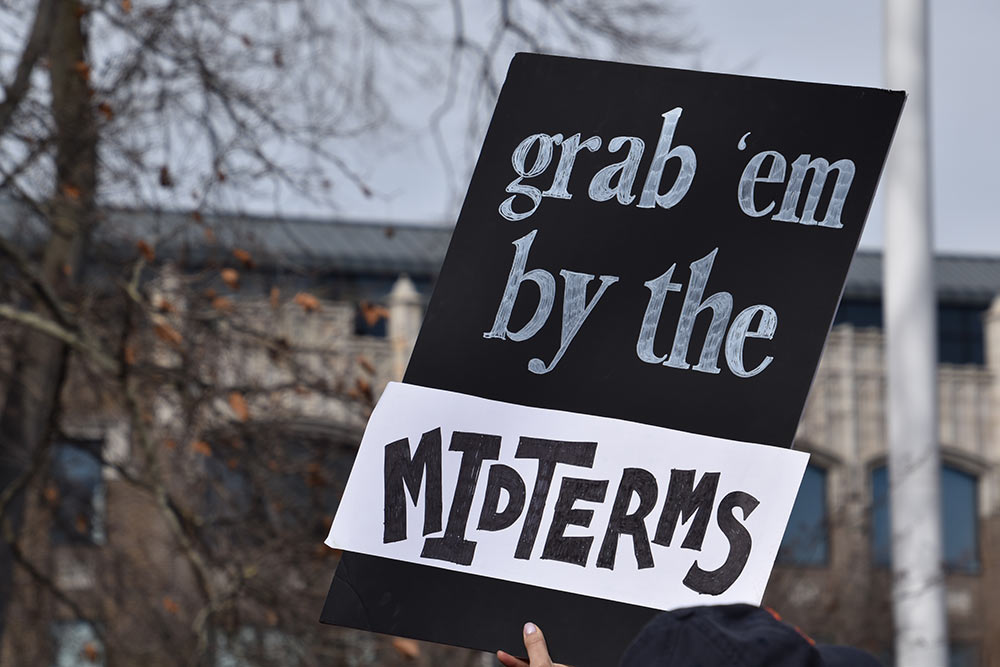10 Important Family Issues on the Ballot This November

Your midterm vote is your family’s voice—and it matters!
I know what you’re thinking: I can’t take any more talk of politics! And, honestly, I hear you. I’m already exhausted from all of the cringey campaign commercials, the political showboating—which for some reason includes politicians who aren’t even running, and the overall tension that seems to go hand-in-hand with election season in this country. Seriously, I get it.
Still, as much as I’d like to turn off my news alerts and retreat to just about anywhere else until after election day on November 8, I know that a defeatist attitude isn’t helpful. There’s no denying that our government is full of flaws, from the federal level down to the local, but the one thing we have going for us is that we have a say in how things are run and how we can move forward. We have the right to vote in our elections as citizens of the United States, which is something not everyone in the world has. And as important as it is to be exercising this right for ourselves, it is even more important for our families.
Simply showing up to the polls is the bare minimum, though. We also need to take time out of our over-scheduled lives to research the candidates on our ballots, so that we can make informed decisions based on what matters to us both as individuals and as parents. Every open seat carries tremendous power, whether it’s a U.S. senator or your local school board representative, and voting down party lines without knowledge of what each candidate stands for isn’t going to do you, your family, or your community any favors.
As a busy (and very tired) parent, I know all this research is a big ask. So, in an effort to help you, my fellow exhausted caregivers, I’ve compiled a list of some of the top family issues to consider with care. Because, truly, your midterm vote can influence this election, and ultimately, the future of this country.

Schools and Curriculum
Are you frustrated because there aren’t enough bus drivers in your school district? Does your child need the help of an aide, but the school can’t afford one? Are you horrified by the fact that passionate teachers are quitting left and right, leaving states to lower qualifications for teachers to recruit seemingly anyone to fill the job vacancies? Do you worry about senseless book bans in your child’s school? All of this can simply come down to who you vote for.
We often hear about the big guys in the Department of Education in Washington DC, but they actually have very little to do with how our local schools are run—that’s all at the state and local levels.
From the school board to the superintendent to your state congress representatives, they all have a big say in what your child’s experience at school is like. When you’re researching candidates, look at their proposed policies for schools in your area—this includes curriculum, parental rights, teacher pay, and more. Make sure the campaign promises of who you vote for are aligned with what you want as a parent of a student. Because the last thing you want to be is that mom on the school’s Facebook page who complains about budget cuts after voting for politicians who don’t prioritize public education.
Reproductive Rights
Thanks to the Supreme Court’s (SCOTUS) overruling of Roe v. Wade in June of this year, decisions on abortion rights are now up to states. In the months following this ruling, we’ve seen states put laws into place that completely ban abortions—many of which have no exceptions for rape, incest, the health of the birthing parent, or the health of the fetus. These laws have left health care workers to make the impossible decision of providing life-saving care to patients knowing they could lose their license, or possibly even be criminally charged for their services. Not to mention, these abortion bans are resulting in birthing parents having to either travel across state lines for abortion care (assuming they have the means to do so), or go through the trauma of an unplanned, unwanted, or unviable pregnancy.
The risk to reproductive rights in our country goes beyond the right to legal, safe abortion. Politicians have also called for bans on emergency contraception and intrauterine devices (IUDs), and there’s no telling when attention turns to other forms of birth control as well.
Since SCOTUS’ June ruling gave the power back to the states, your vote carries incredible weight this year. For instance, in North Carolina, if just a few seats in congress flip to Republican, the party will have a supermajority in the state—meaning if Republicans pass an abortion ban that the Democratic governor then vetoes, they will have the power to overturn that veto.
And it doesn’t stop at the state level, either. Politicians at the federal level have already started writing up and promoting their own abortion bans that would affect every state in this country. On the other side, President Biden has promised to codify Roe if two more Democrats are elected into the senate this election.

Public Resources
As a mom of two young children, I rely on story time at the local library, morning trips to the playground, and summer playdates at the splash pad to keep my kids entertained when they aren’t in school or daycare. I also have my oldest daughter enrolled in a musical theater class through our town’s art center, and my youngest had a blast participating in the parks and recreation tot’s soccer league this past summer.
All of these fun activities are provided to us either for free or at a very affordable rate through our local government. And for us parents to have access to these kinds of programs, there needs to be room for them in the yearly budget—which is financed through taxes.
The fact is, we aren’t going to get out of paying taxes (more on this in a minute). However, this truth isn’t going to stop politicians from promising to lower our tax rates. If they do end up following through on these promises, it’s important to understand that it means there will be less money to work within the budget. So, if lower taxes is an important issue for you, then make sure to really dig through your candidate’s proposal for how they plan to make the numbers work. Are they going to cut their own salary and benefits? Probably not. They’re going to slim down costs in other areas—which very likely includes public resources that so many parents rely on day-to-day.
Gun Reform
After the tragic school shooting in Uvalde, Texas last May, gun reform regained some steam, and the federal government passed the Safer Communities Act in June. Sadly, this didn’t stop a mass shooting in a Chicago suburb during a 4th of July parade. Gun culture in America has left all of us somewhat fearful of large crowds and public spaces, and our kids are growing up having to practice active shooter drills starting as early as their daycare and preschool years.
Whether you are a fierce advocate for the Second Amendment or you are an advocate for a nationwide ban on assault weapons, it’s reasonable to agree that things aren’t working as they are now. However, our nation is deeply divided on what we believe is the best way to address the problem. And that’s where our lawmakers come in.
Gun reform is another issue where both state and federal representatives carry immense power, and the good news for parents is that most candidates are not shy to share where they stand on this issue (which means we shouldn’t have to do deep internet dives to research this topic). When you’re weighing your political options, decide where gun reform falls on your list of priorities, then look closely at what your candidates believe in and what they propose in terms of reform. While you’re doing this, keep in mind that no matter where you stand on the topic, we have a constitutional right in America to bear arms (which means gun laws are likely to be challenged in court), so politicians with extreme promises are unlikely to follow through. Instead, look for promises that offer some kind of compromise—such as common sense gun laws—which are more likely to pass and hold up in court.
Taxes and Inflation
With all of the rising costs associated with inflation right now, money is on just about everyone’s mind as we go into the midterm elections. We’re all spending more at the grocery store, at the gas pump, on our energy bills, and pretty much everywhere else, and we’re looking for ways to cut corners. To be completely honest, it sure would be nice to see less of my paycheck go toward taxes—especially when I don’t always agree with how our federal and my state governments are allocating funds.
But, as I said above, every time the government lowers our taxes, they have to make up for that revenue loss. We all have our own financial priorities, which is why it’s not enough for us to just take a politician’s word that they won’t raise taxes or that they’ll go a step further and actually lower them, we need to research how they plan to do this. As you look into their proposals—and they should have a proposal because otherwise, they’re just throwing out empty promises—ask yourself if the costs and/or programs they plan to cut are worth the extra money in your paycheck.
Taxes are not the only midterm election issue to consider in terms of family finance, though. Inflation is one of the top issues Americans are focused on as we get closer to the midterm election—and for good reason! We’ve all felt the effects of inflation over the last year and our wages have not kept up with the cost of living. Because of this, just about every candidate on the ballot this November is out there talking about the economy, but again we need to look at what exactly they are proposing to be done to combat the problem.
The truth is, most of the power to fight inflation in the present falls on the federal reserve, which is separate from the federal government. And, unfortunately, their approaches often hurt our spending power at first, but still offer relief sooner than government interventions will.
Historically, government interventions to quickly fight inflation provided short-term relief, but then went on to have dramatically opposite effects in the long term. This is why something like the Inflation Reduction Act, passed in August, is structured to fight inflation over time. Unfortunately, the problem with this approach is that Americans aren’t feeling the relief now, which is when we really need it.
Politicians know all this, but they’re betting on the public not understanding effective inflation reduction strategy when they show up at the polls in November. So, again, if the candidate you’re voting for is promising immediate relief from inflation, look closely at how they plan to provide this relief. Chances are high that these promises are empty.

Childcare and Universal Pre-K
The cost of childcare in the United States is at a crisis level. Despite wanting to, some parents can’t afford to grow their families because they can’t afford to put another child in daycare, and others are reluctantly leaving the workforce because the take-home pay after childcare costs isn’t enough to make it worthwhile.
Both the federal and state governments have a say in what, if any, help they will provide parents who are struggling to pay for childcare. For instance, affordable childcare and free universal pre-k were key parts of President Biden’s spending plan back in 2021. Unfortunately, due to two politicians in the Senate, this plan wasn’t passed, leaving the American people without relief. This alone is evidence of how every senator and congressperson is essential to whether or not a bill gets passed—especially when it comes to childcare.
If this spending plan had passed, the details of the universal pre-k program indicated that while the federal government would initially help cover the costs of the program, individual states would also have to put money toward it. For six years, the federal government would provide less and less funding that would ultimately leave states to cover the entire cost of the program if it continued into the future. Because of this, states would have had to opt into the program, which would have required congressional support and approval. Imagine if this had been passed and your child couldn’t participate in the free universal pre-k program simply because your state elected officials decided it was not worth the investment.
Of course, this example is hypothetical since none of this came to pass. Still, the scenario—both as it turned out and what could have been—is something to keep in mind as midterm elections approach. Who you vote for could directly affect whether or not a program like this will be presented again, and if it will be approved.
Paid Family Leave
The United States is the only developed country without any paid family leave for its citizens, despite that 84% of the population is in favor of some kind of program. It’s an issue politicians love to talk about, but there has been no real progress in establishing something, anything, at the federal level.
But, we don’t have to rely solely on the federal government for some kind of paid leave program because a handful of states allocate a portion of their resources to offer paid family leave to residents. Unfortunately, the number of states that do provide this critical benefit is significantly outnumbered by those that don’t.
Paid family leave is another hot-button topic in our country, and while it may not be a focus in this election cycle, it will be again at some point—likely before these candidates are up for reelection in the future. Because of this, it’s important to look into your candidates’ stance on the topic, so that you can get a sense of how they would vote should a bill make its way to them during their term in office.
LGBTQ+ Rights
The fight for equal rights for the LGBTQ+ community has been going on for decades, but over the last year, we’ve seen a lot of anti-LGBTQ+ legislation both presented and passed at the state and federal levels. Many of these laws directly impact LGBTQ+ youth, such as Florida’s “Don’t Say Gay” law and Texas’ law that requires student-athletes to be placed on teams based on the gender they were assigned at birth.
While your federal representatives certainly have the power to make big changes in the fight for equal rights in the LGBTQ+ community (the senate plans to vote on federal protections for same-sex marriage after the midterm election), it is at the state level that some of the most drastic laws are being passed. Depending on where you live, it may be difficult to research where your candidates stand on this issue, but it’s essential to do, no matter how long it takes. Because even if your child has not come out yet, there is nothing to say they won’t at some point in the future. And if and when that day comes, you’re going to want to live in a state where they will be welcomed, accepted, and have access to the health care and resources they need to live a happy and fulfilling life.
Climate Action
All you have to do is take a look at extreme weather in the last year to see some of the effects of climate change. As parents, we not only have to consider this issue for ourselves but for the planet we hope to leave our children. What does their future look like if we don’t vote for politicians who promise to take action against climate change? I want to leave behind a world where my kids are as safe as possible from natural disasters, and where they can feel confident enough in our planet’s future that they go on to grow families of their own someday.
Unfortunately, opting for stainless steel straws and hybrid cars will only do so much to fight the effects of climate change. We also need politicians who are willing to pass regulation laws and stand up against the corporations that are doing the most damage. And this is true at every level of the government.
The research for this issue is two-fold. Not only do you need to look into what candidates are saying and proposing on the issue, but also if they are associated with or have received any donations from problematic corporations (such as large oil companies). Admittedly, the second part of this task might be a challenge, as our government has yet to pass legislation requiring donor transparency (another issue worth considering this election!). Regardless of how much information you’re able to find, just do your due diligence to ensure that what a candidate says on climate change is aligned with who they do business with.
Student Loan Reform
A lot of attention has been on student loan forgiveness over the last couple of years, but while this relief is welcomed by so many who are drowning in debt, it doesn’t actually fix the problem. And as someone who is still paying off her student loans, I am much more concerned about how I can ensure my kids don’t end up in this same situation than I am about forgiveness for myself.
Between 2000 and 2001, the average cost of one year of tuition at a public four-year university came out to around $3,501, and that number grew to $9,377 between 2020 and 2021. Today, the average total cost (including tuition, books, and room and board) of four years at a public university for an in-state student comes out to $102,828. The cost of a college degree is continuing to rise, and at this rate, I can only begin to imagine how much it will cost by the time my 6- and 3-year-old daughters graduate from high school.
Federal student loan repayment is structured by the Department of Education, which is staffed by people chosen by the president. But, while the midterm election doesn’t affect this particular office, it does impact the House of Representatives and the Senate, where bills are regularly drafted regarding student loan reform and regulations on college tuition.
At the state level, public colleges and universities receive funding from the government, which is why tuition at these schools is usually less than at private universities. When education budgets are cut, though, that means fewer funds get directed to these schools, resulting in even higher tuition costs for students to help make up the difference.
All of this is to say that if we have any hope of making college affordable and accessible for our children, then we have to vote for politicians who are interested in actually fixing what’s broken, not just putting a bandaid on the situation.
Voter Resources
Historically, midterm elections have always had low voter turnout, which is unfortunate because they carry a lot of power. With so many important issues affecting families on the ballot this November, it’s essential that parents don’t sit this election out. If you need more information on voting in your state, check out these resources to learn about registration deadlines, early voting, voter registration status (and how to register), and personalized voting information, including sample ballots and assigned polling places.
Remember, even though it might not always feel this way, your vote truly matters and has the power to make a big difference in your community and your country.








